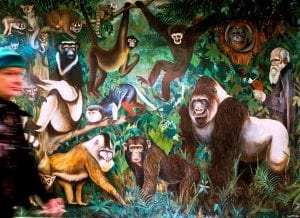Should Animals have Human Rights?
By uczruld, on 30 October 2017
 The question of whether animals should be given non-human personhood was the topic of a lecture this week, given by Professor Volker Sommer at UCL’s Darwin Lecture Theatre on Tuesday as part of its ‘Lunch-hour Lecture’ series.
The question of whether animals should be given non-human personhood was the topic of a lecture this week, given by Professor Volker Sommer at UCL’s Darwin Lecture Theatre on Tuesday as part of its ‘Lunch-hour Lecture’ series.
Volker Sommer is a Professor of Evolutionary Anthropology at UCL. His research into the social and sexual behaviour of primates has informed much of his output on evolutionary ethics. The questions driving his presentation included: ‘Is a chimpanzee a thing or a person?’ ‘Is an orangutan an item of property or a being with legal rights?’ ‘Should animals be used in harmful biomedical experiments?’ ‘Should we keep apes in captivity?’ ‘How can legal cases be fought on behalf of animals?’
As part of the presentation, Professor Sommer showed clips of primates engaged in behaviours that we traditionally consider ‘human’ – including one where a bonobo is shown playing Pac-Man and another where a gorilla is seen carrying a three year old human child who fell into its zoo enclosure to safety.
Professor Sommer explained that there are various arguments for and against granting non-humans legal personhood, including privileges currently reserved to members of the human species such as a right to life, freedom and bodily integrity. The overarching question that informed the discussion was: ‘who should belong to the “community of equals”?’
Many people find such ideas strange: humans have an inherent tendency to be ‘speciecists’. We discriminate against other living beings because they do not belong to our own species. The speciecist attitude is similar to other types of discrimination, such as religionism, racism, sexism, or heterosexism. It has been prominently criticised by philosophers Peter Singer and Paola Cavalieri.
Non-human personhood and the demands to expand ‘human’ rights to include animals are debated in several contexts, including law, philosophy, and science. As part of the lecture Professor Sommer detailed his involvement in a test case in Austria, where campaigners put forward the argument that Hiasl, an adult chimpanzee who was brought to Europe from a forest in Sierra Leone as an infant, should be granted human status. It was part of a pitch to prevent Hiasl from being transferred to a vivisection laboratory near Vienna. More recently, an orangutan in Argentina called Sandra was granted ‘non-human person rights’ – judges ordered that she should be freed from captivity after spending her entire life there.
Professor Sommer’s illustration of the debate formed part of a wider context – what he calls the dawn of a ‘new era of inclusivity’. He was adamant to point out that calls to grant rights to non-human great apes should be seen as a ‘door-opener’ to wider demands: there is no logical reason to replace the animal-human boundary with a new one – that of great apes versus other animals.
As an avid evolutionary theorist, Professor Sommer was keen to emphasise the importance of breaking down these barriers in the ways that we consider ‘animals’. He reminded us that we are all animals, after all.
 Close
Close

